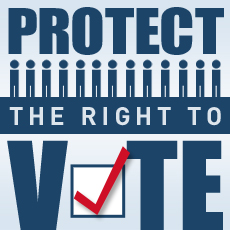
“[T]he vote is the most powerful instrument ever devised by man for breaking down injustice and destroying the terrible walls which imprison men because they are different from other men.” — President Lyndon Baines Johnson at the signing of the Voting Rights Act, Aug. 6, 1965
"The right to vote is not only the cornerstone of our system of government — it is the lifeblood of our democracy. And no force has proved more powerful — or more integral to the success of the great American experiment — than efforts to expand the franchise." —Attorney General Eric Holder at the LBJ Library, Dec. 13, 2011
On August 6, 1965, President Johnson stood in the Capitol Rotunda in Washington, D.C. to deliver at his signing of the historic of 1965. His soaring remarks echoed back to the founding of the nation and to the ongoing struggle — from slavery to the march in Selma — for freedom.
Last night, Attorney General Eric Holder reflected on our history and on LBJ’s legacy to reaffirm the Obama administration’s commitment to protecting the franchise for all Americans. He to a packed crowd at the Lyndon Baines Johnson Presidential Library & Museum in Austin, Texas. At this venue, named for the president who championed voting rights in the darkest of days, Attorney General Holder emphasized the importance of continuing the fight and enforcing that law nearly half a century after its passage.
The battle to ensure access to the ballot has been long and hard-fought, Holder said, noting solemnly that the Voting Rights Act followed a brutally violent—and sometimes deadly—struggle for equal rights. But that battle did not end with President Johnson’s signature. A healthy democracy requires that all citizens are able to participate. He reminded the crowd that reaching this goal demands continued dedication and continued vigilance.
That is why Attorney General Holder is taking very seriously the Department of Justice’s mission to protect the fundamental right to vote. The Department of Justice’s work on this issue is especially crucial in light of the wave of recently passed voter suppression laws around the country that are narrowing access to the ballot. In just the 2011 legislative season alone, we saw regressive measures introduced in more than 30 states, and 16 states advanced measures that would create more barriers to voting. These laws come in several different forms—either requiring citizens to present photo identification or proof of citizenship in order to vote, making it more difficult to register or conduct registration drives prior to elections, reducing the opportunity for early voting or disfranchising more citizens with past criminal convictions.
In last night’s address, the Attorney General, quoting a recent speech by voting rights icon Rep. John Lewis, described these laws as a deliberate attempt to exclude voters — low-income individuals, minorities, senior citizens, young voters and students — from democracy. He correctly pointed out that this new wave of regressive laws hearkens back to the ugly days before 1965.
“The reality is,” he noted, “that — in jurisdictions around the country — both overt and subtle forms of discrimination remain all too common.”
The Attorney General assured that the Department of Justice will not allow states to reverse the landmark progress made with the Voting Rights Act and will take strong and decisive action to thwart efforts to restrict the franchise of voting.
Specifically, he described a multi-pronged strategy to ensure a broad base of voter participation, which will include: a push for public support of much needed reforms, such as banning deceptive practices about when and where to vote, modernizing voter registration, and the need for fair and effective redistricting efforts and the Department’s continued enforcement of a number of federal voting rights statutes. These include, among others, Sections 5 and 203 of the Voting Rights Act, which require certain states and jurisdictions to seek preclearance for changes to voting procedures and to provide bilingual written materials and other assistance; the National Voter Registration Act, which helps to increase voter registration and keep accurate registration lists; and UOCAVA and the MOVE Act, which protect the right to vote for those overseas and U.S. service members and their families.
In 1965, President Johnson at the Voting Rights Act signing: “[t]oday is a triumph for freedom as huge as any victory that has ever been won on any battlefield.” But yesterday evening, Attorney General Holder reminded us that the battle to secure the right to vote for all Americans is not over.
He emphasized that “protecting this right, ensuring meaningful access, and combating discrimination must be viewed, not only as a legal issue — but as a moral imperative.”
We could not agree more. and tell Attorney General Holder you agree with his efforts to protect the right to vote.
Learn more about voting rights: Sign up for breaking news alerts, , and .



